ENVIRONMENTAL VICTORY
Relief for more than 6,000 farmers as gas exploration application is withdrawn
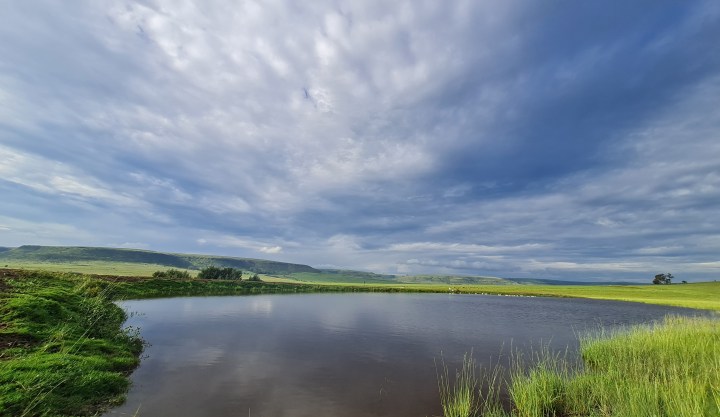
An application to explore for gas on more than 6,000 farms in KwaZulu-Natal and the Free State was withdrawn by Rhino Oil in February after years of resistance from affected farming communities.
Farmers in KwaZulu-Natal and the Free State have breathed a tentative sigh of relief after an application to explore for gas on thousands of farms was withdrawn.
Rhino Oil and Gas Exploration South Africa – known as Rhino Oil – applied for onshore exploration of petroleum and gas spanning more than one million hectares across 6,000 farms in September 2018, which was accepted by the Petroleum Agency South Africa (Pasa) in October 2018 (after which the minister would grant the application).
This was despite there being a Department of Mineral Resources and Energy (DMRE) moratorium prohibiting the granting of technical cooperation permits, exploration rights and production rights for petroleum and natural gas.
Since first hearing about the application in late 2018, a Free State farmer who is the chairman of the district farmer’s union, George Galloway, has worked with his fellow farmers and landowners in the two provinces to oppose the application.
Moolman & Pienaar Inc, on behalf of the farmers, has over the past three years challenged Pasa’s granting of the application through internal appeal and court processes, including seeking court orders to compel DMRE Minister Gwede Mantashe to respond to the internal appeal, threatening the minister with contempt of proceedings, and the minister rejecting the internal appeal.
But, in the end, it was Rhino Oil that brought a stop to the exploration by withdrawing the application in February this year.
“We were on the verge of launching a review application against the minister, but have now received this letter from the minister and Rhino Oil that they have withdrawn their application for exploration rights over the area,” Clarissa Pienaar, a director of Moolman & Pienaar Inc, told Our Burning Planet.
“It was a huge effort from all the farmers’ associations to get together and fight this.
“They are fighting… and paying for South Africa. They fought this on their own. And it is something that is benefiting the whole country, and in particular, Gauteng — who get their water from there,” she said.
Travis Smithard, director of Rhino Resources, told Daily Maverick that they withdrew the application because “we interpreted the chance of biogenic methane there to be low and so not technically attractive. We could be wrong — we expect to learn more as we go.”
Galloway said: “We, the farmers, had to finance this fight. But… it cannot carry on like this,” adding that if extraction occurred, he doesn’t think he’d carry on with his farming activities.
Pienaar reflected: “The fact that they have withdrawn the application is a huge relief for not just the farmers, but for South Africa as a whole because that area includes water resources for the upper Vaal, Orange and catchment areas which supply Gauteng. It’s a very big farmer-intensive area and a protected area.”
A farmer in the region, who wished to remain anonymous, said, “[The farmers] put their foot down to not accept this and gave their support.
“As one farmer said — no one is looking after our interest. We have to pay for everything to protect the food supply in SA.”
A deep mistrust
The application was for early phase exploration for oil and gas and was restricted to “desktop data review and the undertaking of an aerial survey”, according to Rhino Oil’s scoping report.
The scoping report stated: “No stimulation, pressure testing, hydraulic fracturing or water abstraction is included in the proposed exploration work to authorised by this Exploration Right.”
However, as the scoping report acknowledged, “It is evident that public opinion on whether the project should be approved is a resounding ‘no’.”
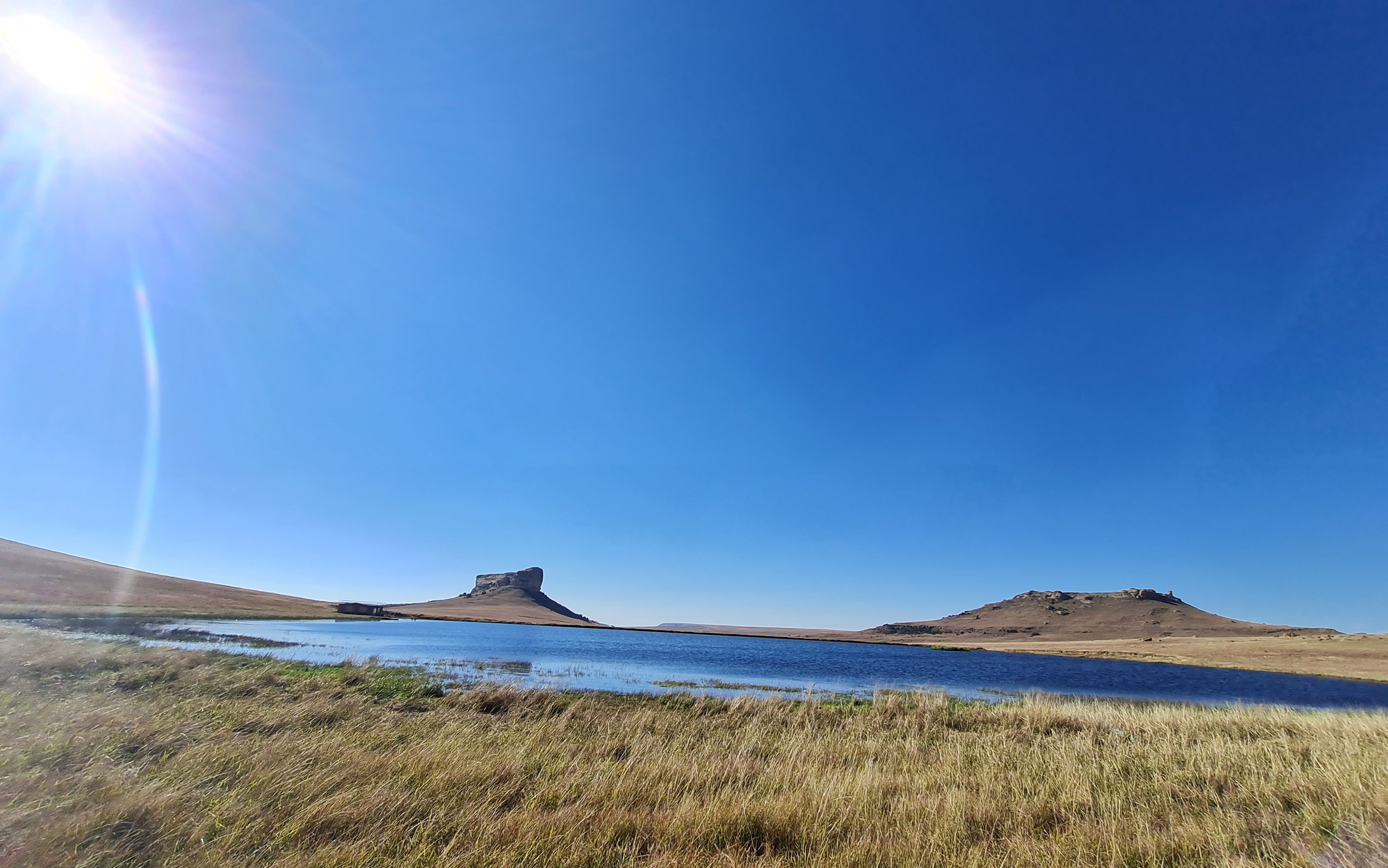
An area in northeastern Free State where Rhino Oil applied for rights to explore gas and oil. “I think you can understand why we do not want someone to destroy it,” said an anonymous Free State Farmer. (Photo: Anonymous Free State farmer in application area)
Obviously, the end goal would be to extract gas resources, if they were found.
Smithard said: “The objective is to explore for biogenic methane and associated gases [helium and hydrogen]. If those gases are found in commercial quantities, we will apply for production rights from Pasa.”
The area in the application included water source areas for the Upper Vaal, Orange and Thukela catchments.
According to Rhino Oil’s scoping report, “These ‘water factories’ supply a disproportionate amount of runoff and the water they provision supports the growth and development needs of the national economy. The water supply to Gauteng, in particular, is of key significance, not only to the province but to the whole country.”
Landowners were concerned about how this extraction would affect their water resources.
Rhino Oil has maintained that it was not exploring shale gas, but was exploring for biogenic methane and associated gases and that they would “extract naturally”, not with “fracking”.
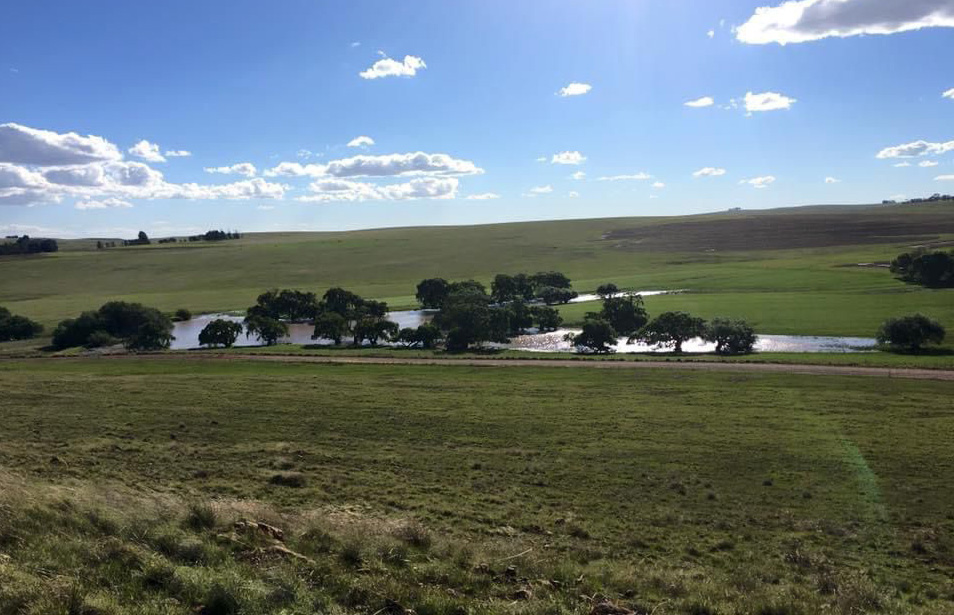
An area in northeastern Free State, near Harrismith, where Rhino Oil applied for rights to explore for gas and oil. (Photo: Jan van Niekerk)
Smithard explained that the extraction process — called a conventional pressure depletion — is where a well is drilled and the gas that sits in that well rises naturally, just as a helium balloon naturally rises in the air because it’s more buoyant or less dense than the surrounding air. Shale gas extraction is done by creating permeability through “fracking” (hydraulic fracturing).
Smithard was adamant that agriculture could continue alongside these processes, citing the example of the many wells that were drilled for gold mines in the Free State on farms that are still operational.
However, landowners and farmers are not convinced and express concern that once these types of companies are granted access to extract minerals it will escalate to more invasive processes like fracking, which entails a process that most likely imports seawater and sea sand and can lead to the pollution of groundwater resources.
A Free State farmer in the application area, who wishes to remain anonymous for security reasons, said a huge issue of concern is that because the government is the custodian of the minerals according to law, the landowners can’t stop anybody from going on to their land to get the minerals if they are granted authorisation.
“One of the most important things is going to be that the farmers will have no control of who’s on the land,” they said.
“The short and the sweet of it is… we don’t trust these people. At all,” said Galloway.
He added: “The government and certain people, as far as we are concerned, do not appreciate the impact that fracking will have on our lives and nature.
“And government and certain people think we — the farmers — use food security as an excuse for many things. But it is not the truth.
“That’s a blatant lie… because, you know, this area … is what I call the meat basket of this country [referring to cattle and sheep] and is also known as the maize basket of this country.”
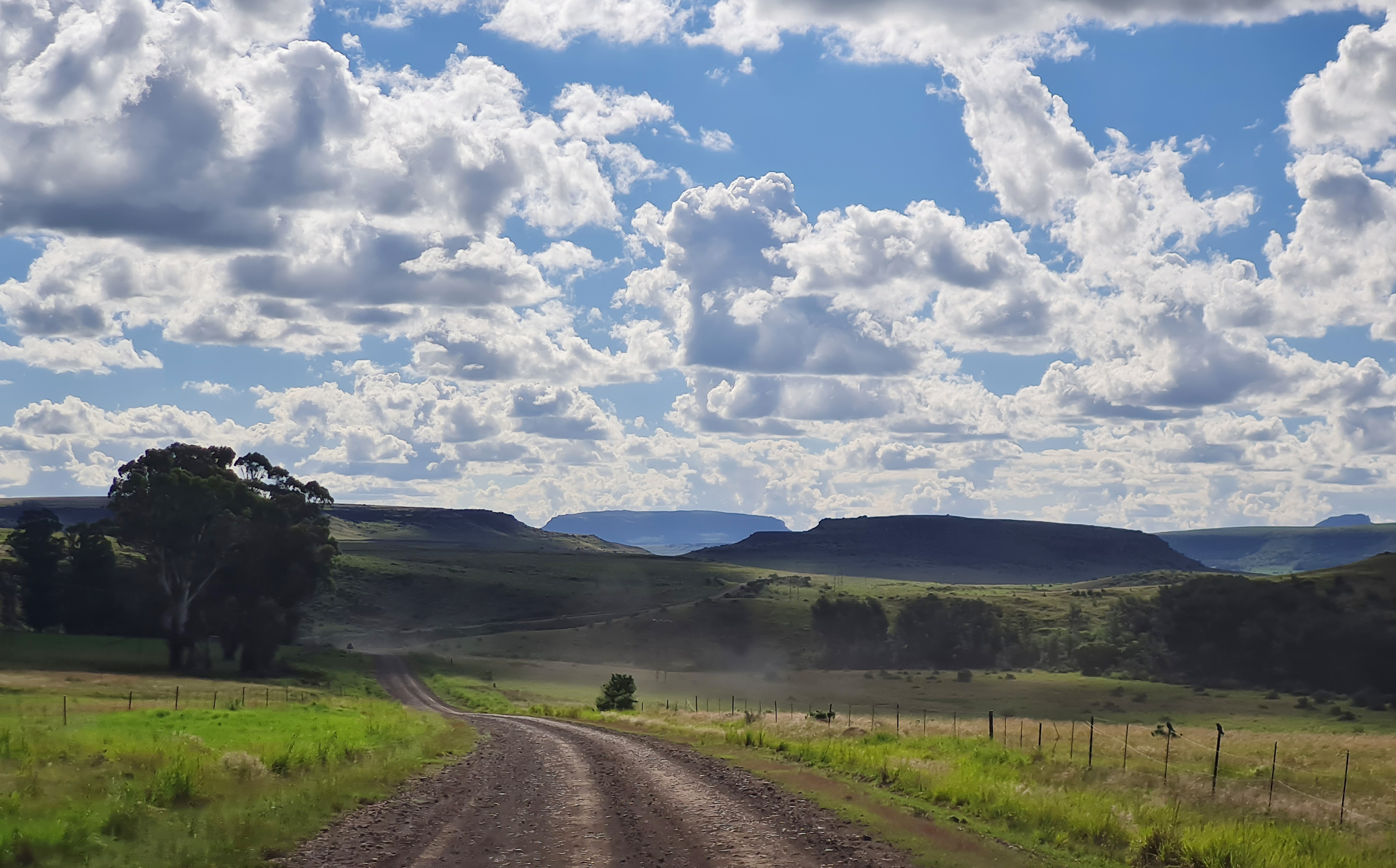
A northeastern Free State scene where Rhino Oil applied for rights to explore gas and oil. (Photo: Anonymous Free State farmer in application area)
A freelance geologist, who worked in the Karoo for several decades and wished to remain anonymous for fear of jeopardising future work opportunities, questioned the intentions of Rhino Oil wanting to explore for gas when it’s a well-known fact that South Africa has huge gas resources.
“We know there is gas in the Karoo rocks of South Africa. To extract gas is extremely useful for South Africa. It is the honesty of the present team of consultants and developers that is questionable.
“Although I am not against mining as an activity, I do object if the environmental impact is not revealed during these applications.”
The geologist believes these exploration applications are a smokescreen and are intended to convince the government to allow them to frack, as there comes a stage where gas can’t naturally rise and you have to start breaking the earth.
“In our application, we have to show that we’re technically competent, financially competent, that we’ve got a good case to try and at least find this gas. Because, of course, the last thing the government wants to do is essentially give the right to explore to some entity that ultimately is not going to be able to do it,” Smithard said.
Rhino Oil has applied for multiple exploration rights over various areas, some of which have already been granted for aerial non-invasive prospecting (like ER 294 and ER 318).
Currently, another Rhino Oil application of a similar size (ER 350) — spanning approximately 780,000 hectares over 4,000 farms in a similar area in the Free State and KZN — is awaiting the minister’s response after Moolman & Pienaar Inc filed an internal appeal against Pasa’s acceptance of the application. ER 350 is depicted below.
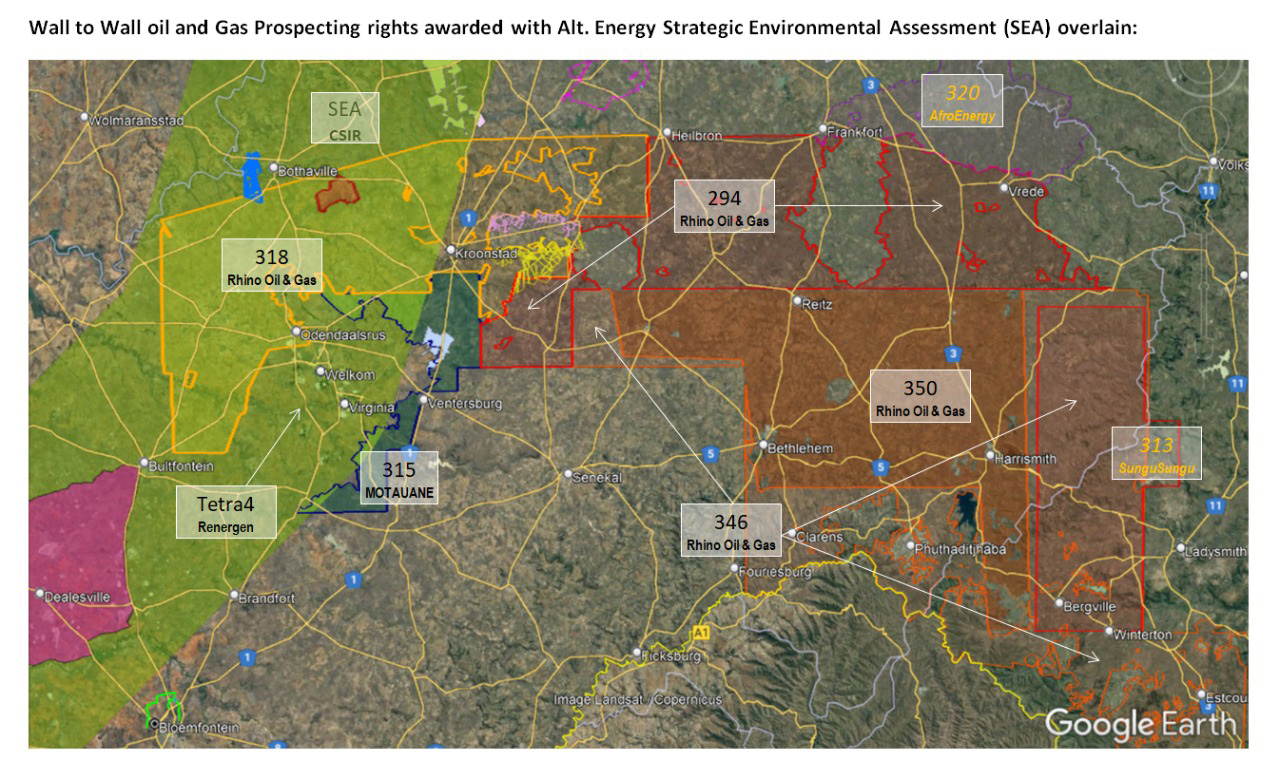
A map depicting the areas where mineral exploration companies, including Rhino Oil and Renegen, have applied for exploration rights in Free State and KwaZulu-Natal. (Credit: Jack Armour)
Also depicted on the map above are gas projects by Renergen, a helium and natural gas producer in South Africa, which Smithard says wants to follow suit.
Just another day on site #Renergen #driling #lng #helium pic.twitter.com/szGTRLfgmX
— Renergen (@RenergenJHB) October 2, 2019
“This is what I’m afraid of — we don’t know who’s going to be the next applicant,” said Galloway. DM/OBP





















 Become an Insider
Become an Insider
Rhino oil,what a false name,rather put your money in rhinoceros conservation.zYou think you can bypass public opinion, because you have a receptive ear with our corrupt goverment!!!Public opinion was a resounding NO!!!We the vitizens of south africa is on the war path, we are not going to let a corrupt goverment destroy the country we love!!!As more and more public get involved in fighting your “making money while destroying the environment, type of company’s, you will see the wind has changed and is blowing against you!!!